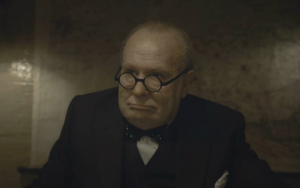Metro Canada: Why we still have so much to learn from Winston Churchill.
 By Richard Crouse – Metro Canada
By Richard Crouse – Metro Canada
Winston Churchill, born 143 years ago, is suddenly hot again.
“When I started work on this movie in 2016 the only Churchill I had in mind was Albert Finney’s A Gathering Storm which was brilliant,” says Darkest Hour director Joe Wright. “It had been made more than a decade ago. We weren’t aware of the Brian Cox movie, we weren’t aware of Dunkirk, The Crown hadn’t come on yet. It didn’t feel topical at all. Then suddenly the events of 2016 happened and this wave of topicality came and overcame the film.”
The fireworks in Darkest Hour begin in May 1940. It’s less than a year into the Second World War and Winston Churchill, played by Gary Oldman, is made prime minister after Neville Chamberlain lost the confidence of parliament.
He’s an unconventional choice. His own party thinks of him as a drunkard — it is said that between 1908 and 1965, he partook in 42,000 bottles of his favourite champagne Pol Roget — and members of his war cabinet favour negotiation with the Nazis over resistance and war. The so-called English Bulldog battles them and nagging self-doubt as he stays steadfast in his determination to fight the Nazis while finding an exit strategy for 300,000 British troops stranded at Dunkirk.
Wright likens Churchill’s crusade against Hitler to the resistance that has sprung up around the world in reaction to various far-right groups.
“Churchill got a lot of things wrong in his life,” Wright says, “but in this particular instance, in this context, with this enemy, he understood the perils totalitarianism and Nazism and bigotry and hate and he resisted. I think we are living in a society now that would not be the same if not for his resistance. I think that is really important to remember to fight back. To look outside of our important domestic concerns and look at our global domestic concerns.”
Darkest Hour is a historical drama with all the trappings of Masterpiece Theatre. Expect sumptuous photography, costumes and period details. What you may not expect is the light-hearted tone of much of the goings on. When Churchill becomes prime minister, his wife makes an impassioned speech about the importance of his work. He raises a glass and, cutting through the emotion of the moment, says, “Here’s to not buggering it up!” It shows a side of Churchill not often revealed in wartime biopics.
When I tell Wright I found the movie funnier than expected, he laughs. “Especially when it is called Darkest Hour.”
“I think Churchill was a very funny individual. Anyone you read who was with him, from his secretaries to his bodyguards to the politicians who were working with him, all talk about his humour. It was one of his overriding characteristics. We wanted to make sure it didn’t turn into Carry on Churchill so there were gags in there we cut.
“I think, like all of us, it was kind of a coping mechanism. The reason sex and death seem to be the main sources of humour is that they help us deal with things that might otherwise cause us anxiety. “
Wright adds that as the battle against totalitarianism unfolds the film becomes more serious. “His foe was probably the most terrifying adversary we had ever encountered, so the stakes were very high.”
